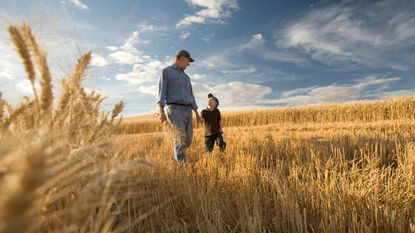
Passing a farm, vacation home or other property down for generation after generation has its challenges. LLCs and partnerships can help.
When you purchase through links on our site, we may earn an affiliate commission. Here’s how it works.

Land is unique; there is no more of it being made. It’s for this reason families will hold tight to farms, ranches and coastal property for continued lifetime income, appreciation and, of course, sentimental value.
Estate planning professionals commonly see real estate pass through many generations — grandfather, father, children, grandchildren and even their own descendants — with little interest in selling or transferring property outside of extended families. Demographic changes that began in the middle of the last century have shown branches of these families moving away from ancestral homesteads to populate cities and to find professions apart from agriculture. Other families hold fond memories of annual family vacations at the beach or the mountains and want their children and grandchildren to enjoy the same with their families.
As estate planners, we may be charged with finding strategies that allow extended families to continue enjoying appreciation in the real estate’s value, to cooperatively use the property, or to share in a pro-rata share of mineral production and crop revenue while equitably dividing taxes and other expenses.
Be a smarter, better informed investor.
Save up to 74%
Profit and prosper with the best of expert advice on investing, taxes, retirement, personal finance and more - straight to your e-mail.
Profit and prosper with the best of expert advice - straight to your e-mail.
Families often have a common goal of preserving equality of ownership across each generation. As ownership passes from generation to generation, what might have once been a one-third fractional ownership in the land held by a father and his two siblings can evolve to a one-ninth interest for each of the father’s three children. If each of those three children has three children of their own, then each grandchild may become a 1/27 owner. With no further planning, deeds would need to be prepared at each generation as ownership divides. Further planning is also needed to share revenue and expenses as the property passes to each generation.
Formation of a family limited liability company or partnership is a practical solution to the intergenerational ownership and management of family property.
Limited liability companies (LLCs) came into being decades ago to organize small businesses. In the early 20th century, a business owner would be personally liable for a company’s debts and claims unless he or she formed a corporation. Corporate taxes were often impractical for most small businesses, so later, subchapter S corporations originated under the tax code to simplify taxes while also limiting personal liability. Beginning in the late 1970s, many states created statutes allowing for the formation of limited liability companies. LLCs started to gain popularity in the 1990s, and today, many small businesses are organized as LLCs.
An LLC operating agreement puts in place the person or persons who are responsible for the daily operation of the business or collection of rents, payment of expenses and division of revenue. The operating agreement also divides ownership into units, with each member owning units in proportion to his or her ownership percentage.
Perhaps your grandfather was a farmer or rancher. His land was his vocation. He may not have thought of himself as an agribusiness entrepreneur, but he was. His family farm or ranch was a business and should still be treated as such. Many in his generation relied on a farm or ranch to support their families. Their work allowed the resources and flexibility for generations to move away from rural life to find other pursuits, in part because technology and improved work practices have changed agriculture so it doesn’t require the same amount of labor as it once did.
An LLC or family partnership may not have been in your grandfather’s toolbox. However, it is in yours and should be considered to meet your current interfamily goals.
Typically, families wish to continue holding their entire farm or ranch as a single unit rather than sub-dividing it at each generation. A family LLC or a family limited partnership is an effective way to do so. Ownership of the entire farm can be held in the LLC, with each family member owning a pro-rata share of the LLC’s membership units based on that person’s individual ownership percentage.
There are a number of benefits for future generations owning the farm within an LLC rather than directly:
Trusts are generally an effective way to hold and manage property for beneficiaries. There are some practical disadvantages when actively managing a farm, ranch or vacation property inside a trust, assuming that one’s goal is to maintain centralized management of farm property for the benefit of your descendants for many generations.
Family farms and ranches have traditionally been a source of pride and provided the income to build wealth for multiple generations of American families. Our ancestors’ struggle and good fortune have made it possible for current generations to acquire recreational property and appreciate endless opportunities away from our roots.
Limited liability companies and partnerships are often used to shape both large and small firms, allowing those firms to continue for as long as their owners wish. Using this solution for the ownership and management of farms, ranches and recreational property can preserve the properties’ intrinsic and extrinsic worth, honor the efforts of family ancestors and allow the properties to be a source of income and pleasure for generations to come.